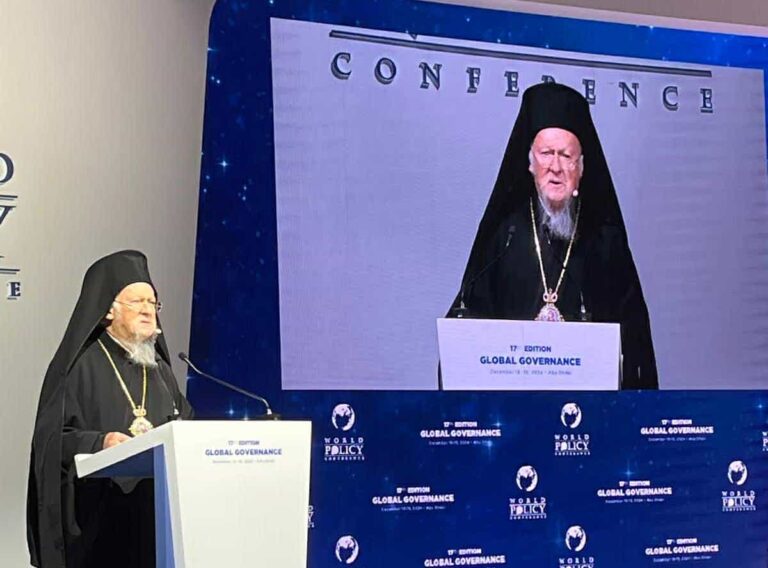During his keynote address at the World Policy Conference 2024 in Abu Dhabi, the Ecumenical Patriarch Bartholomew highlighted the importance of spiritual wisdom in addressing contemporary global challenges.
He drew inspiration from the First Ecumenical Council of Nicaea in 325, emphasizing the need for unity and collaboration across diverse cultures and faiths to tackle issues such as climate change, ethical technology development, and economic inequality.
The Ecumenical Patriarch called for the establishment of a global ecumenical environmental council and the creation of ethical frameworks for advancing artificial intelligence.
He emphasized the integration of spiritual insights and practical governance for true success, proposing the joint celebration of Easter in 2025 as a symbol of unity among Christian traditions.
Keynote Address of the Ecumenical Patriarch Bartholomew at the World Policy Conference 2024:
Your Highnesses,
Your Excellencies,
Distinguished Leaders and Participants,
Dear Friends,
In this esteemed gathering of the World Policy Conference 2024 in Abu Dhabi, we express our gratitude and bring greetings from the Church of Constantinople, the Ecumenical Patriarchate. Our conciliar tradition offers valuable insights for addressing contemporary global challenges.
As we approach the 1,700th anniversary of the First Ecumenical Council of Nicaea in 2025, we reflect on Emperor Constantine’s vision of unity and variety, authority and freedom, which provides valuable lessons for our present quest for world understanding and collaboration.
Historical Wisdom and Contemporary Challenges: The 2025 Easter Celebration: A Symbol of Hope & A Path to Unity
The upcoming joint celebration of Easter in 2025 by various Christian traditions offers an opportunity for togetherness and mutual understanding, reflecting the spirit of the Council of Nicaea.
The call for a common Easter computation based on the Julian calendar is a step towards unity and cooperation among Christian traditions, fostering better dialogues and mutual understanding.
Celebrating Christ’s Resurrection together can help overcome past divisions and lead to future unity, demonstrating shared faith and cooperation for God’s glory.
Recommendations for Global Leadership
Inspired by Nicaea’s wisdom, we propose actionable steps to honor our spiritual legacy while addressing current societal issues. These recommendations integrate ancient knowledge with present necessity, emphasizing shared values and mutual respect for global responses to challenges.
Addressing the ecological crisis requires spiritual authority to protect God’s creation from human greed. We support the establishment of a permanent ecumenical environmental council under UN advisory authority to coordinate religious responses against climate change.
The group acts as a bridge between spiritual traditions and world government, offering moral guidance on environmental policies and promoting interfaith cooperation on climate action. Their goal is to ensure that environmental policies are informed by both scientific knowledge and spiritual insights on humanity’s role as stewards of creation. Drawing on the Ecumenical Patriarchate’s experience in fostering communication between religions, they advocate for a holistic approach that combines spiritual wisdom with practical governance.
In response to the rapid advancements in biotechnology and artificial intelligence, the group supports the development of a global ethical framework that incorporates religious and cultural perspectives. They emphasize the importance of ethical systems rooted in timeless wisdom to guide technological progress in a way that upholds human dignity and serves the common good.
Additionally, the group underscores the need for inclusive economic policies that prioritize sustainability, justice, and social solidarity. By balancing economic efficiency with social cohesion and human dignity, they aim to address wealth inequality and ensure that economic growth benefits all members of society.
Overall, the group advocates for a comprehensive approach to global challenges that respects spiritual traditions and future generations. They emphasize the integration of spiritual wisdom with practical solutions to promote human flourishing, societal harmony, and environmental sustainability. By maintaining a focus on universal values and moral direction, they seek to contribute to public discourse without compromising their spiritual integrity.
As they look ahead, the group sees an opportunity for Christian traditions to come together in unity and collaboration, drawing inspiration from historical examples of harmonizing spiritual wisdom with governance. By leveraging this convergence to drive meaningful action, they hope to establish connections between religious insights and contemporary knowledge that will benefit society for generations to come. Please rewrite this sentence.
Source link

